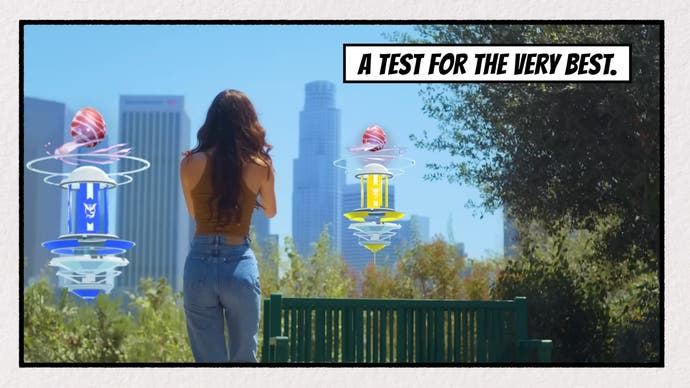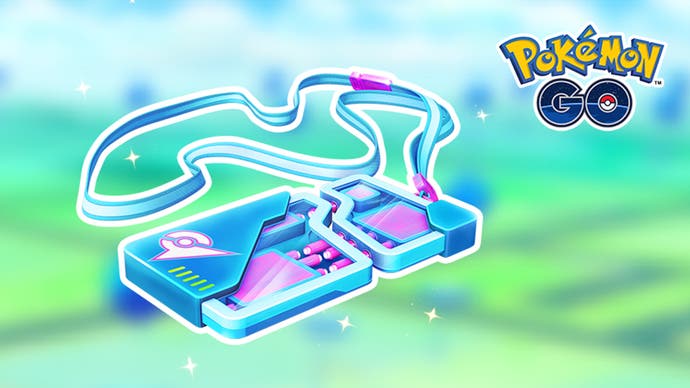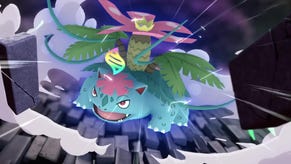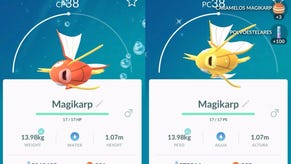Pokémon Go developer teases "blockbuster slate" of summer features, amidst major Remote Raid changes
Popular method of playing at home to be capped, almost doubled in price.
Pokémon Go maker Niantic has announced a set of changes to Remote Raid gameplay, in a bid to rebalance a lockdown-era feature it says has grown to overly dominate the app's economy and game balance.
Beginning next Thursday, 6th April, players will be limited to a cap of five Remote Raids per day (though this cap may change and increase for certain events). The cost of Remote Raid passes will also increase from 100 to 195 coins, or from 300 to 525 for a pack of three (though with a possibility to receive one free as part of the game's weekly rewards). To counteract some of this, a discounted three-pack of in-person raid passes will be added to the game's shop, while the endgame XL Candy resource will be made more abundant from in-person raids.
These are changes designed to nudge players away from Remote Raids, and seem likely to spark a strong reaction from some of Pokémon Go's many fans - in particular, those who previously campaigned against the disappearance of the app's many lockdown-era bonuses which made the game easier to play. Again, these changes seem to place the reality of how some fans want to play Pokémon Go in opposition to the vision set out by its creator Niantic. So, why was Niantic so sure these changes were necessary? And if this is the stick, where exactly is the carrot?
In advance of these changes being made public, Niantic invited me to speak with its veteran developer Ed Wu, the company's Pokémon Go VP, to talk over the decision in detail via an extensive Zoom chat. In it, we discuss the reasoning for these changes - why, in Niantic's eyes, remote raids have become too convenient a "shortcut" - and how many people will likely be affected, as well as why this is all happening now. In addition, Wu looks to the future, teasing the carrot still to come of new features designed to entertain Trainers on their local streets this summer. Finally, we finish up with a more general chat about features players are hoping to see on the horizon - including Shadow Raids, and the eventual introduction of Pokémon god Arceus.
"It's a big and meaningful change to a huge part of the game... so as you might imagine for a change of this magnitude, we've of course examined many possible alternatives," Wu begins. "After thinking very carefully about this, what we're doing is relatively simple. Generally speaking, the goal is to keep Remote Raids as a part of Pokémon Go, but to do so in a sustainable way. The change is necessary for the long term health of the overall game, and our principles of getting folks outside and exploring the world together.
"The world has largely moved back outdoors and Remote Raid passes have come to dominate the overall experience of playing in a way we never intended. It's become essentially a shortcut to playing the game. We've seen an imbalance because the current price of Remote Raid passes is matched to the Premium Battle Pass which is distorting the game economy, and making the game unsustainable in the long term."
"We know this is a big change and some folks will have a strong reaction."
Simply put, with Remote Raids priced the same as in-person passes, there's no incentive to raid together. Meanwhile, the ease of raiding remotely has led to players raiding far more than Niantic intended, unbalancing the availability of Pokémon and the app's endgame XL Candy grind.
"We know this is a big change and some folks will have a strong reaction to that," Wu acknowledged. "We're very empathetic to that reaction. But we really think this is the right thing for the overall long term health of the game, and our desire to make sure it's great for many, many, many years to come."
As a heavily engaged daily player, it's pretty unusual for me to use five Remote Raid passes in a day - and it remains to be seen how often Niantic will lift that cap, as it says it might for special events. I was keen to find out how many people Niantic expected to be impacted by the introduction of a cap - and how the company's own metrics showed the extent to which remote raiding was dominating the game currently.
"There's a wide variety of folks who play Pokémon Go," Wu said. "Generally speaking, the number of people who will be affected by the cap on a day-to-day basis is a relatively small part of the total set of folks who play our game. It's often sometimes useful to ground what the median player of Pokémon Go is - it's something I talk about with the team all the time. The median player of Pokémon Go is probably someone like a Singaporean grandma who walks with her senior group for 30 to 60 minutes every morning as part of her exercise and social routine, [who] mostly focuses on catching Pokémon with her friends, and maybe very occasionally or maybe not at all raids.
"It's important to ground [the fact] the vast majority of folks in our game find a lot of value in Pokémon Go from many other parts of the game beyond raiding. But the game balance and economics of Pokémon Go are now being dominated by Remote Raids in a way we never intended. And for a segment of the player population, this is fundamentally unsustainable. It constitutes a small, small part of the player population, [but] it's a player population we care deeply about as they are some of our most engaged players who have invested many, many years, and much of their attention and enjoyment into this game. And it's important to make sure the game is balanced for all segments."

But what is it about the game's balance that Niantic is trying to fix? What is the alternative future - where the current state of play continues unaltered - Niantic is trying to avoid? To this, Wu brings up the way played raided in the past, as an example of Niantic's framework for thinking about why remote rates as they exist now are unsustainable. "When we debuted raids in 2017, the requirement to encounter and defeat a raid boss meant you had to gather several of your friends, family or colleagues and go out in the same place at the same time to a gym. And then once you defeated it, if you wanted to walk with that group to try again - you all had to walk 10, 15, 20 minutes to the next gym together."
Of course, you could drive instead, but regardless of how you got there, the journey was important. Niantic seems keen for raids to return to a state where they were more impactful an experience, and more meaningful overall - not just a gameplay loop you can complete 10 times in a row from your sofa. "Every game is about both the goal as well as the journey to that goal," Wu says. "The value folks may be thinking about and geared towards is that end goal. [But] actually the value they're deriving from a game comes from the entirety of the journey to that goal, and Remote Raid passes are a shortcut through that entire journey.
"When games offer shortcuts, they also ensure these don't distort the overall value of the game."
"Many games have shortcuts, right?" Wu says, explaining that any game which isn't just geared to taking your money has to balance that. "When games offer shortcuts, they also ensure these don't distort the overall value of the game by doing things like imposing limitations on the number of times they can be used. So in many ways, this is actually very analogous to a wide variety of games that have similar loops, and where ultimately, a game is about both the journey as well as the destination."
That may be true, but I think it's fair to say the way people interact with Pokémon Go's gameplay loops has changed significantly over time, especially so over the past few years as the game has adapted due to the Covid pandemic. Almost every bonus introduced in the early lockdown-era has now been removed, which makes these changes now seem at best rather late, and at worst, an attempt to tune the game back to a time some players have now permanently moved on from.
"Remote Raid passes are such a huge part of the game's overall economy and balance for a number of players that we've wanted to be careful and thoughtful about approaching changes," Wu says, when I ask why these changes are happening now. One reason Niantic is optimistic about these changes is the engagement it has seen in the recent introduction of in-person-only raids, such as the game's rollout of Elite Raid events which have brought players together for new or ultra-rare species. Despite a bumpy rollout, Niantic's data shows people have put their shoes on and turned up.
"[We need to] ensure we are delivering on the promise of things like Elite Raids where we have meaningful, interesting, new forms of gameplay out there in the real world," Wu says. "With [the launch of] Elite Raids, we were able to see the impact and actually see many people come out again. Yes, it's not at the level it was in 2017. But one of the things that's really heartening to us is that when we look at the data, folks who are heavily engaged in Remote Raid passes, the vast majority of them are actually also engaging in Elite Raids and real-life experiences. In fact, the proportion of folks who raid Remote Raid exclusively as they play Pokémon Go and do not participate in some form of in-real-life activities are actually a very, very, very small portion of the total [player] population - and one we actually see decreasing quite a bit over time.
"The world has, I think, evolved and changed year after year, from 2021 to 2022, to 2023. And we're seeing those changes in our players and their excitement to engage again in going out into the real world. The timing is in part because yes, we've debuted these new features like Elite Raids, we've been able to see the impact they've had. And that folks are excited, even if they Remote Raid, to also go out there back into the real world. That's given us the knowledge and confidence this is the right thing to do for the overall long term health of the game."
Even with this all said, it still feels to me like today's announcement is more stick than carrot. Thankfully, Wu suggests much more is on the horizon to tempt players together over the coming months, as the game heads into its typically bustling summer schedule. "We have an incredibly exciting slate of both new forms of raiding, as well as new features in store we're working really hard on," Wu teases. "So while these economic changes are what we're talking about today, it's not the majority of what the team is investing its time and energy on. One of the things that's really exciting to me, having led the development of raids and our social trading and gifting features, as well as our buddy features and PVP over the past several years, is that I really do believe we have a blockbuster slate of summer features that rise to that level of importance for the game. I'm super excited about them, I'm sorry that we're not ready to talk about them today, but some of them really are incredible new raiding experiences. And we've also got other features in store to bring new meaningful ways to explore the world together as those previous features did."
"I really do believe we have a blockbuster slate of summer features that rise to that level of importance."
For now, Wu points to recent features already available in the game that aid players looking to raid more in-person - "like showing the time left in a lobby without having to enter the lobby itself, as well as adding, in the Nearby view, the number of people in lobbies in gyms nearby so you can see where activity is, and go join up". Additionally, Niantic's social app Campfire will soon be released globally with new features currently in testing. "We're committed to making this a change where it's not just about the economy," Wu continues, "but really meaningfully making in-person raiding easier and an exciting part of people's lives again."
I couldn't finish our chat without a quick question about Shadow Pokémon in raids, an unannounced and unconfirmed feature which some fans with a keen eye on the game's files believe they have seen some evidence of. "They'd be a great candidate for raids - not to say yes or no that we would do it..." Wu says. "But if we're going to do it, we want it to be a meaningful feature that is interesting and differentiated, and not just like 'Oh, we're just going to put that Shadow Pokémon into the raid rotation'. Generally speaking, we want to do things that feel great when we do them, and are a new, memorable experience that ties people to the Pokémon they are encountering and catching, to the location and to the memory of actually working with others to take on something really epic. So yeah. It's a great idea, let's put it that way!"
On how remote raid changes will affect Niantic financially...
"The goal here is not short-term revenue," Wu says. "Of course, imposing a cap goes to show this is not about extracting more money, even though we are raising prices. This is well balanced, where we really believe this is not going to create a short-term revenue impact for us. At the end of the day, we are a business that wants to provide this experience for our Trainers for many years to come. There's a long-run sustainability impact to the changes, and that's the reason behind them."
On Campfire as a tool to add players to existing community groups...
"One of the things that's really important to me, and to Niantic, has been the strength of our local communities. It's something we are deeply grateful for - that there are folks all around the world who take their own time and effort to lead and form local groups, and those exist on a variety of different kinds of channels. What we're trying to do with Campfire is provide a meaningful way for those [existing] groups to find people in their local communities and find people who are interested but maybe not aware they can group up and get together, and for those local communities to grow."
On whether future new features or types of raid will be in-person only...
"The new features that are coming really span the gamut and it's maybe not quite as binary as Remote versus local raids. Raiding is a very particular feature, right? Let's take for example, gifting and social - a very different kind of feature, but with elements of exploration and social interaction, even if it's not real-time or in-person. I was very, very excited to see the uptake by our player community of sending postcards after Vivillon launched. It's consistent with Niantic's values of exploring the world, finding new places and sharing those places with your friends, even though that might be remote and asynchronously. It's in a way that encourages everybody to go out and explore the world, and when you do get the chance to come together, to meet and play the game together, it becomes all the more meaningful because of that time that you've spent sending postcards from all around the world to each other. So I wouldn't put it necessarily into local versus remote features, that kind of binary bucket. There are many meaningful ways we can inspire folks to explore the world and have social interactions and I think our features will reflect that diversity of our player base in the way they approach the game."
"Frankly, we could go and change a wide variety of things but right now we're trying to keep it [simple]."
On the long-standing remote raid damage buff becoming a permanent feature...
"We're not making other changes right now. Over time, we might. One thing that's important is a variety of limitations around Remote Raids have not addressed the fundamental issue of the imbalance they create in [the game's] economy, but a daily cap absolutely will. And that gives us a lot more confidence and freedom to make other changes without worrying about their distorting effects. So, nothing to announce there and we're really trying to keep the changes simple. Frankly, we could go and change a wide variety of things but right now we're trying to keep it [simple]."
On the likelihood of EX Raids returning...
"We're trying to evolve them in a variety of ways. I was very close to the development of the EX Raids, they're very near and dear to my heart. At the same time, I want to acknowledge there were ways in which it was difficult to schedule them and get the right set of folks scheduled to play together at the right place at the right time. I think it was often a source of frustration for both the community and for us, and so we are looking to evolve EX Raids, and you can see that in things like Elite Raids. This is not to say we wouldn't try EX Raids again, and I don't want to categorically say we never will, but we're also cognisant of some of the frustrations folks have around them. Any time we want to approach it again, we want to make sure those are well addressed."
And on a future release of Arceus, plus whether it may finally arrive via Elite Raids...
"I don't want to commit to anything - let me be clear about that! But any time we introduce a Pokémon that folks are really excited about, we want that to be a really epic experience. One thing I point to is Kecleon - which was hidden away for years! We wanted to do something which befitted that Pokémon, and the wait and excitement for it. I'm really glad with how that turned out in practice - it generated a lot of excitement and got folks to notice their local PokéStops a little bit more, in a way they hadn't before. Any time we want to take on something that's exciting in that fashion, we really want to do it justice, that's memorable and that ties people's memories to the location they visited and the people they were with. Whenever we take on a challenge that epic and interesting, rest assured that's how we will approach it."












